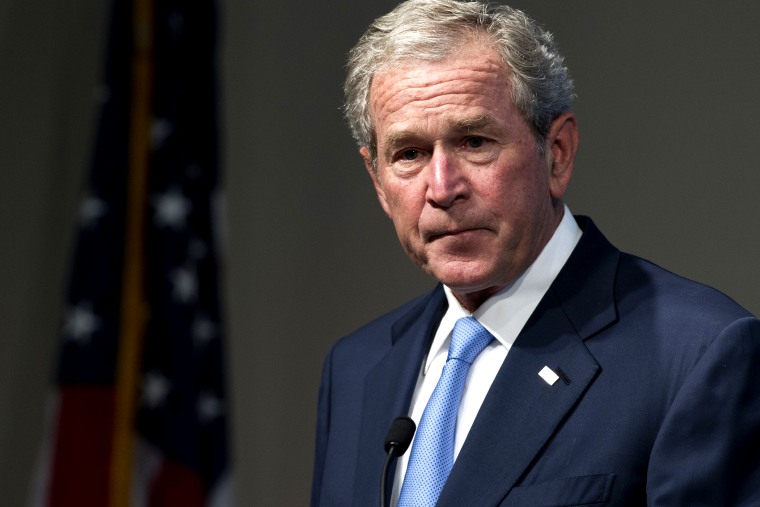When it comes to the Bush/Cheney lies about Iraq, the consequences have been severe for the world. The political consequences for the those who told the lies, however, have been quite mild.
But for some, the observation itself is apparently offensive. Judge
Laurence Silberman argued in the
Wall Street Journal yesterday that to say the former president "lied" the nation into a disastrous war is "dangerous."
The charge is dangerous because it can take on the air of historical fact -- with potentially dire consequences. I am reminded of a similarly baseless accusation that helped the Nazis come to power in Germany: that the German army had not really lost World War I, that the soldiers instead had been "stabbed in the back" by politicians.
It's worth noting that Silberman's op-ed was directed at Ron Fournier, of all people, who's aggressive, unyielding hyper-centrism usually makes him the target of criticism from, well, me.
But in this case, Fournier apparently said on Fox News that George W. Bush "lied us into war in Iraq," a claim that Silberman considers "shocking," "dangerous," "false," and apparently the sort of thing that makes Silberman think of Nazis.
This puts me in the awkward position of defending Fournier, though the circumstances warrant it.
Silberman's argument is a familiar one: the pre-invasion intelligence was wrong. Bush trusted intelligence agencies to provide him with accurate and reliable information, and the Republican president launched a war assuming the evidence he'd seen was accurate.
Silberman concedes that the information was "dead wrong," but this is a detail we know with the benefit of hindsight, not something George W. Bush knew at the time. Silberman considers himself an authoritative voice on the subject, given that he co-chaired the Commission on the Intelligence Capabilities of the United States Regarding Weapons of Mass Destruction during the Bush/Cheney second term.
Silberman does not mention that the commission he chaired did not even investigate whether the Bush administration manipulated intelligence. Senate Republicans refused to allow the commission to investigate this matter, fearing it would harm Bush's reelection prospects. [...] The question of whether, in addition to being victimized by faulty intelligence, also misrepresented the intelligence it did have, was left to a second Senate report, called the "Phase II" report, which came out a few years later. That report, which was endorsed by two of the committee's seven Republicans and all its Democrats, concluded, "the Administration repeatedly presented intelligence as fact when in reality it was unsubstantiated, contradicted, or even non-existent." Incredibly, Silberman's op-ed does not mention the Phase II report at all.
I can appreciate why this remains a sore subject for the right. The scope and scale of Bush's failures continue to reverberate years later, and now his brother is running for president. It stands to reason Republicans would prefer Americans think of the failed former president as a dunce who launched a disastrous war because he was wrong, rather than a liar who deceived the country into supporting a disastrous war. The former isn't great, but it's preferable to the latter.
Reality, however, is stubborn.
Silberman's piece concluded, "Sometime in the future, perhaps long after most of us are gone, an American president may need to rely publicly on intelligence reports to support military action. It would be tragic if, at such a critical moment, the president's credibility were undermined by memories of a false charge peddled by the likes of Ron Fournier."
The problem here is not with Fournier's accurate assessment. Rather, the problem is with the Bush/Cheney White House ignoring evidence it didn't like, and manipulating reality to tell the story officials wanted to tell to justify a catastrophic war.
That's the "tragedy," not a stray comment from a Beltway pundit.
